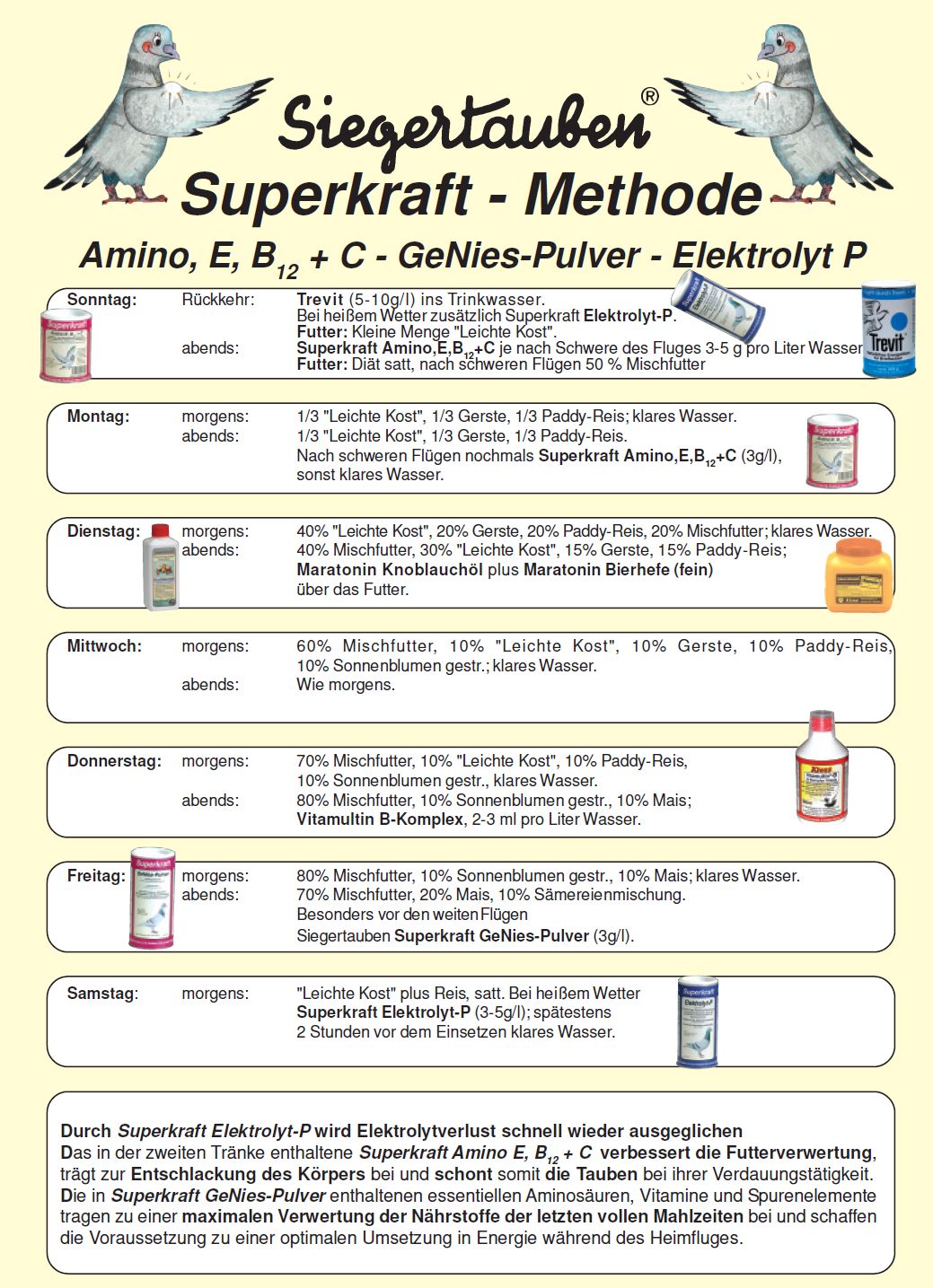VITAMINS - article by Peter Klaus...
Vitamins are organic compounds that are necessary for the maintenance of all bodily functions (growth, health, fertility, performance). Because vitamins are generally not produced by the human or animal body itself can, but with the food the body to be carried must, they are known as essential (= essential) micro-nutrients. Yet each vitamin has its special task that can not be taken over by a different vitamin. To maintain an uninterrupted history of all physiological functions, all vitamins are required to regularly. One of the components is missing occur deficiencies which could cause prolonged continuing also to death. Differently as a carbohydrate, protein, fat and minerals, which are used as nutrients and building materials, the body the vitamins and trace elements as so-called agents exert important functions for all life processes. They act as an intermediary during the various degradation processes in the body and as components of enzymes (ferments). Because vitamins and trace elements themselves are not consumed, but eliminated only after a certain time and renewed, their demand is only a few micrograms to milligrams per day. Trace elements and vitamins have similar functions, they are chemically but fundamentally different. Trace minerals are inorganic, vitamin organic substances. I'm sure you know that a lower supply of vitamins leads to disorders, diseases, poor growth, errors of reproduction and susceptibility to infectious diseases and parasite infestation.
Essential vitamins:
Vitamin A plays an important role in the Visual process. In addition, vitamin A affects a meaning for the promotion, protection and recovery health, growth and fertility, skin and mucous membranes, and is partly responsible for the increase of physical resistance to infectious diseases and parasite infestation.
Finally, vitamin A plays a role in the regulation of the metabolism of carbohydrates, protein and fat.
Vitamin D It occurs in various forms. In poultry, only vitamin D3 of interest is because it has a much better efficacy compared to the D2. Vitamin D3 is responsible for the regulation of calcium and phosphorus metabolism, in particular to improve calcium absorption through the intestinal mucosa and the installation of calcium and phosphorus in bones in the critical mass.
Vitamin E also occurs in various forms. The tocopherol is interesting for animal nutrition. The stabilization of the unsaturated fatty acids are the main characteristics of vitamin E – Preventing its oxidation to toxic (poisonous) Lipoperoxyden – and the protection of the oxygen-sensitive vitamin A from its oxidative decomposition. Thus, vitamin E contributes A supply of the body to an improvement of the vitamin. In addition, vitamin E represents a protection factor for the membrane of red blood cells. It also plays an important role in the conservation of testicular function and the development of the embryo vitamin E.
Vitamin K. The most important physiological function of vitamin K is the regulation and maintenance of the Prothrombinbildung (blood clotting factors). Furthermore, it has important metabolic functions in the pancreas, connective tissue, in the ovaries, in vascular tissue, in the brain, in the skin, in the testes, in the bone, in cartilage, in the liver, in the lungs, in the lymph nodes, in the stomach, spleen, in the muscles, in the adrenal gland, in the placenta, in the spinal cord, in the thyroid gland, in the tendons, in soft tissue and in the teeth. In addition, it promotes acts on macrophages in the immune system.
The following 8 vitamins of the B-complex (B1, B2, B6, B12, folic acid, NICOTINAMIDE, Pantothenic acid, biotin) are 'Performance vitamins' vitamin B1 is involved in the regulation of carbohydrate metabolism and jointly responsible for the normal functioning of brain, nerve and heart muscle, as well as to maintain the normal conditions for peristalsis (bowel movement), fat absorption and enzyme activity.
Vitamin B2 is involved in the energy transmission and generation in the body as part of so-called Flavin enzymes.
So it intervenes indirectly – as other vitamins of the B complex – in the protein, fat, and nucleic acid metabolism.
Vitamin B6 has a central meaning for the entire protein metabolism. As Coenzyme of a series of enzymes, B6 is essential for the schism and synthesis of amino acids, as well as for the transfer, the purchase and removal of various chemical components of protein molecules. An increased protein feeding inevitably creates a higher demand for vitamin B6. B6 is important also for the fat and carbohydrate metabolism, and metabolism of minerals.
Vitamin B12 engages in a variety of metabolic processes, in particular in the protein metabolism and synthesis of amino acids. In addition, it will affect the carbohydrate and fat metabolism. B12 is essential for normal blood formation.
Folic acid plays an important role in the synthesis of amino acids and nucleic acid metabolism. You stands in close connection with the effect of B12 and is involved in the development of red blood cells and of the red blood pigment such as this vitamin. Folic acid also promotes the formation of antibodies.
Nicotinic Acid/NICOTINAMIDE fulfils an important function in which takes place in the body's cells produce energy by hydrogen transfer. Thus all vital metabolic reactions of carbohydrates, fats and proteins are involved in. Nicotinic Acid/-amid is just as involved as on the normal functions of the digestive system function preserving the skin.
Pantothenic acid occupies a central position in the metabolism of carbohydrates, proteins and fats as a component of Coenzyme A (CoA). The acetyl CoA is an intermediate in the reduction of nutrients and raw material of several synthetic steps in the metabolism. In addition, Pantothenic acid plays an important role in the formation of acetylcholine, which is responsible as a carrier substance for forwarding the information to the nerve endings. Finally, she takes over tasks in the detoxification of the body and the establishment of the red blood pigment.
Biotin is an enzyme bound partly responsible for the formation of fatty acids and plays an important role in maintaining the normal concentration of glucose in the body. Biotin indirectly influenced also the protein metabolism.
Choline plays a central role in the metabolism of fats. It is essential for the formation of lecithin and for the transport of fats. As part of acetylcholine (carrier material), it is involved in the transmission of nerve. Choline is also part of the cartilage cell.
Vitamin C is essential for the formation of connective tissue, bone, and cartilage, and for the normal function of that tissue. It is also involved in various metabolic reactions, is closely associated with vitamins B and E and stimulates the immune reactions of the body for infections and stress.

Advertising:

 They buy products here... (click)
They buy products here... (click)



